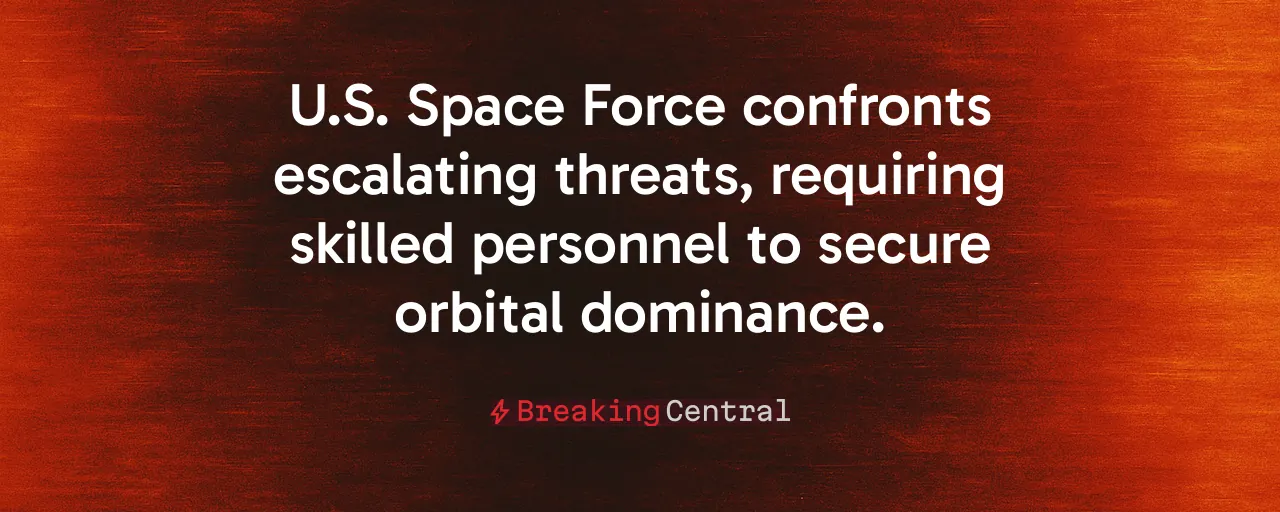A New Frontier Under Threat
The United States Space Force, barely six years old, faces a daunting mission. A recent Department of Defense feature spotlighted Master Sgt. Allison Thodos, a flight chief at the National Space Defense Center in Colorado, whose journey from Air Force recruit to space intelligence analyst underscores the branch's need for sharp talent. Her inspiring journey underscores the branch's need for sharp talent and highlights the urgent challenge of ensuring America's dominance in an increasingly contested orbital domain.
Space has transformed into a battlefield. Satellites critical to navigation, communication, and defense face growing risks from adversaries. The stakes are high, with over $2 trillion in annual U.S. economic activity tied to space assets. As nations like China and Russia advance their counter-space capabilities, the Space Force stands as America's first line of defense in the stars.
The Guardian's Call to Duty
Allison Thodos didn't plan to lead a collections team at the National Space Defense Center. Enlisting in 2007, she served in the Air Force Honor Guard, then trained as a medic before becoming a recruiter. Her 2023 transfer to the Space Force marked a pivot to intelligence analysis, a role demanding precision and adaptability. Her path reflects the kind of versatile, dedicated personnel the branch needs to counter sophisticated threats.
At Schriever Space Force Base, Thodos oversees data collection vital to tracking orbital activities. Her work integrates inputs from military, intelligence, and commercial partners, ensuring real-time awareness of potential hazards. The complexity of her role, blending technical expertise with leadership, highlights why recruiting and retaining skilled Guardians is a national security priority.
Adversaries Eye the High Ground
The threats are real and accelerating. China's Strategic Support Force has tested co-orbital anti-satellite inspectors, capable of shadowing or disabling U.S. assets. Russia's electronic warfare tactics, seen in Ukraine against Starlink, signal intent to disrupt satellite networks. These moves are active challenges to American primacy in space, far from hypothetical threats.
Historical warnings echo today's reality. The 2001 Rumsfeld Commission cautioned against a 'space Pearl Harbor,' a surprise attack crippling U.S. capabilities. Now, with over 8,000 satellites orbiting Earth, the risk of disruption grows. The Space Force, tasked with deterring such threats, relies on units like the National Space Defense Center to maintain vigilance and respond decisively.
Building a Force for the Future
Recruiting talent like Thodos is a crucial step, but not the only one. The Space Force, with roughly 13,000 Guardians, faces fierce competition from tech giants offering lucrative salaries. Enlistment bonuses have risen 15 percent annually to attract STEM talent; retention, however, hinges on more than pay. Programs supporting work-life balance, childcare, and spouse employment are critical to keeping mid-career experts.
Interservice transfers, like Thodos's, prove effective. RAND studies show these moves boost retention of technical non-commissioned officers, bringing seasoned skills to new roles. Expanding such programs could strengthen the force when paired with robust training pipelines and clear career paths. The Space Force also needs to streamline its acquisition process, cutting red tape to field advanced systems faster.
Funding the Fight Above
Money matters. The Space Force's $30 billion budget request for 2025, including $4.2 billion for classified space-control programs, reflects the scale of the challenge. This is, however, a fraction of the Pentagon's total outlays, despite space underpinning nearly every modern military operation. Bipartisan support in recent National Defense Authorization Acts affirms space as a war-fighting domain; critics, however, argue the funds fall short of what's needed.
Congress holds the purse strings, and taxpayers deserve accountability. Transparent oversight of space programs, without compromising sensitive data, can balance security and public trust. Proposals for a Space Rules of Engagement Act could clarify when and how force is used in orbit, ensuring legal clarity while deterring adversaries.
A Unified Vision for the Stars
The Space Force's mission transcends politics. It's about securing America's future in a domain where weakness invites aggression. Guardians like Thodos embody the dedication required, but their success depends on a national commitment to prioritize space. Fully funding defense programs, empowering the branch with acquisition autonomy, and resisting restrictive treaties that limit defensive options represent crucial steps.
Allies also play a role. Shared situational awareness with partners strengthens deterrence, reducing costs while amplifying impact. A voluntary moratorium on debris-creating anti-satellite tests, endorsed by the U.S., may ease tensions without sacrificing readiness. These measures combine strength with responsibility, preserving space for peaceful exploration and robust defense.
America's orbital edge results from deliberate effort. It's built on the ingenuity and resolve of Guardians, the foresight of policymakers, and the support of a nation that values security. As threats evolve, our resolve also needs to evolve. The stars are ours to protect, and the Space Force, with leaders like Thodos, is ready to answer the call.
